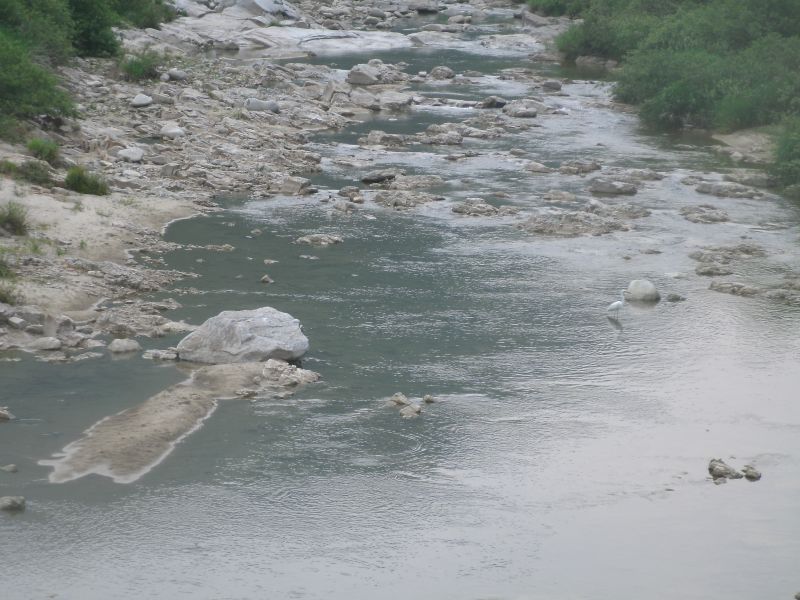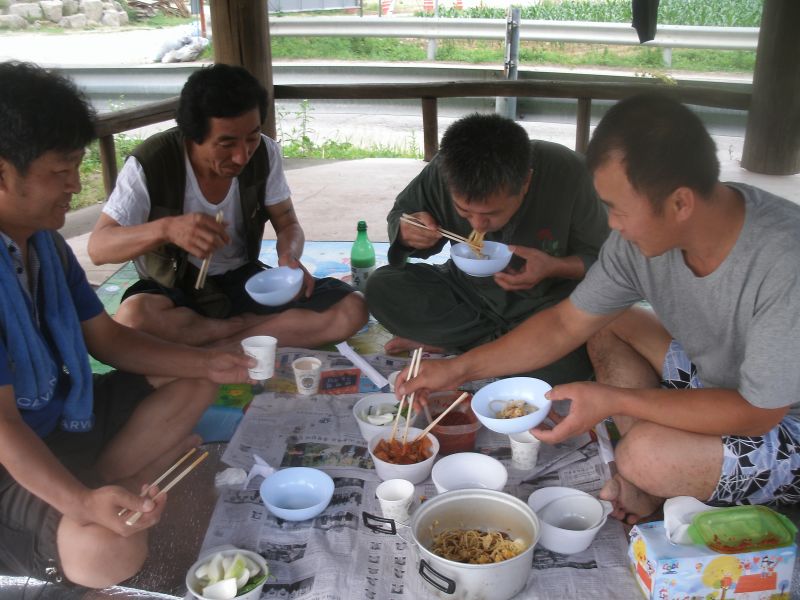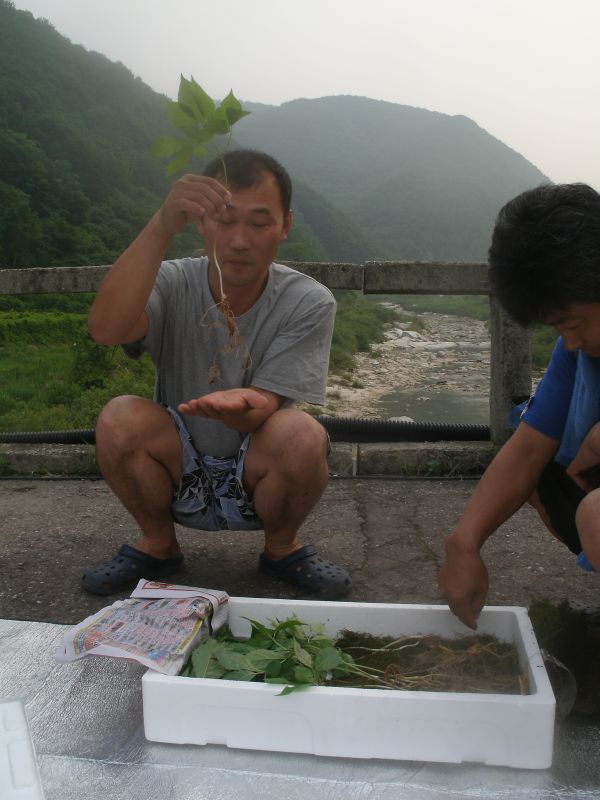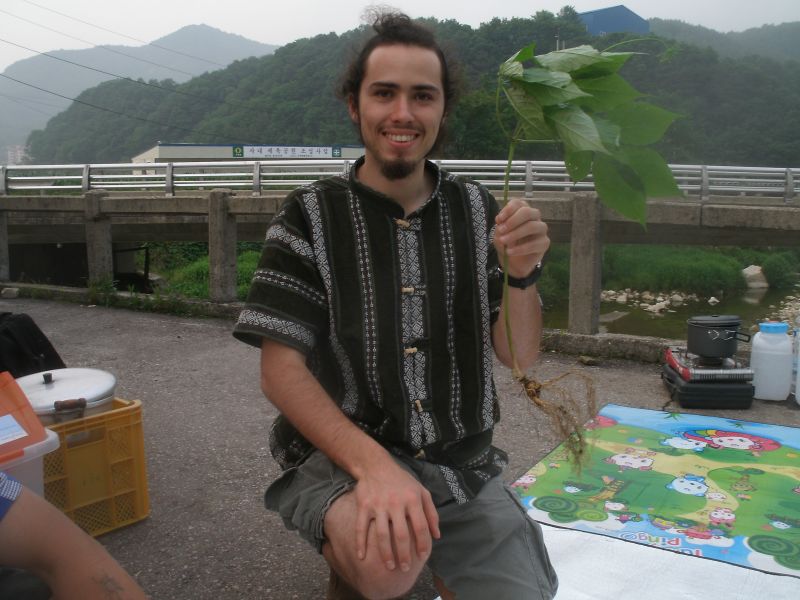The Ginseng Men
One day last week I took a walk to get out of the house after staying inside all morning. I went down a different road than usual and found myself in a part of town that I’d never seen before. It was unfamiliar, strange; I want to say foreign, but of course I’m living in a foreign country, so I could call everything that. It’s just that I’ve gotten used to Korea, but this seemed unlike what I’d gotten used to—doubly foreign. It wasn’t actually that drastically different. The streets were narrower, and the houses were closer to them. One house had flowers growing inside the concrete barrier between it and the street. There were some tiny cinder-block stores with no English on the signs out front. I walked up a hill and passed a mushroom farm—a series of greenhouses each with a few cables strung from one end to the other and, leaning on the cables, logs with holes drilled in them and inoculated with spores. Across from it was a very old man walking out of a blue tin building, and hand farm equipment that looked generations old was lying around. At a crest in the hill I looked out and I could see the rice paddy that’s down the hill from where I live, which I’ve never really seen before because it’s obscured by buildings—this paddy is where the multitudes of frogs live that I hear chorusing in high voices every night through my window.
I suddenly felt a deep sense of the profoundness of this place, simultaneous with a realization that I was only connected to it in the very shallowest of ways, not even knowing well a single person who lives here. I’ve come to this town and lived on the very surface, interacting with the people here barely any more than absolutely necessary to let me buy groceries to survive. But people have been living here and doing things for longer than I have any idea of, maybe only for a few decades, but maybe for centuries. There’s a war memorial just outside town on the road to Chuncheon that’s dedicated to the soldiers who retook this place from the Chinese army in 1951. However old this particular town is, there have been people living near here since time immemorial, surely back through all the dynasties that warred for power over the Korean peninsula starting when there was no writing to record the victories and losses. With something akin to a panic, borne of the knowledge that I have less than three months left here, I decided I needed to hurry and start understanding more about this place than just the places where it’s possible to find food. It felt like if I didn’t do that, I would look back later and think I’d wasted a whole year that was made entirely of the opportunity to learn, but if I did, all the stuff I’d observed over the course of the year would finally solidify into actual knowledge.
Ways to fulfill my resolution started materializing with an almost magical speed. This Friday, I went out jogging with Sean to the disused bridge over the Jichon Stream that we tend to go to. It’s right next to a bridge that’s in use; I’m guessing that it was deemed unsafe and replaced, but then never torn down. When we got there, there were a few trucks parked on it and a tent set up among them. A middle-aged guy was hanging clothes in the dilapidated gazebo that stands at one end of the bridge, next to the modern road that we’d just arrived on. I jumped over the guardrail and said hello, and asked if he was camping (which was a bit of a stupid question because, well, obviously, but my command of Korean wasn’t up to asking more intelligent questions). Through much repetition and simplification, he eventually managed to explain to me that he and his friends were a group of guys who climb mountains to hunt for wild ginseng. It’s a highly prized medicine, much more esteemed than the farmed kind, and can sell for a lot of money. I immediately asked if I could come along. He told me to come back at 8 in the morning, and they’d be going up soon after. So I commenced getting excited, and said goodbye, and Sean and I jogged back home.
I showed up bright and early the next morning. Before I even got to the ginseng men, I came to a couple guys in a little blue flatbed truck, the kind that you see everywhere here. The guys were in beekeeping suits and after I noticed that I realized that the wooden boxes in the back of their truck were hives, with bees flying in and out. I watched them lay a white tray on top of a few white honeycombs on the ground by the wildflowers and weeds that grow along the old length of road that leads to the old bridge. I didn’t manage to strike up a conversation with them, but it was pretty clear what they were doing, anyhow. After they laid the tray down, they drove off.
The ginseng men were unpacking various stuff from their trucks to make breakfast. There were some mats laid on the concrete, and a giant, dented old pot boiling over a gas burner. We all sat down on the mats and someone brought out a pot of rice, and the giant pot was brought over. It turned out to be full of broth made of chicken and deodeok (a root that they might have found in the forest or might have bought in a store, I’m not sure). We talked, though mostly they talked and I didn’t quite understand what was going on. Then breakfast finished and everyone started getting ready to climb the mountain. Only, I discovered then that they hadn’t actually invited me to go hunting ginseng with them, they’d only invited me for breakfast. They told me that I needed boots and long pants, because there are snakes on the mountain. This smelled like an excuse to me, but I didn’t press the issue, because when I stepped back to consider it, this was an obviously pretty tight-knit group of guys who were having a good time together and also knew what they were doing, and I was some foreign yutz who barely understood them and had invited himself along. They all suited up in long pants and boots, but they did tell me that I should come back at five and we’d have dinner. I was disappointed, but I understood, so I biked off back home.
To assuage the disappointment a little, I went and climbed Chang’an Mountain with Sean—the same mountain we always climb, but this time we climbed it from a different direction. At five I biked down to the bridge again and met the ginseng men. “Good luck?” I asked them. “No,” they said. They’d only found four ginseng plants. One of the guys showed me the plants, kept tenderly in a plastic bag for the time being. They’d explained to me before that the older the plant, the more it sells for. It’s possible to find plants that are as much as a hundred years old, though these are of course quite rare, the find of a lifetime. Such a plant could sell for ten million won ($8500). These, he told me, were nowhere near that league; they were mostly five or six years old. I didn’t catch the price he expected to get for them.
We settled down and they brought out the burners to start getting dinner ready. The menu tonight was chicken cooked baeksuk style—just a plain chicken dunked in a lot of water and boiled for a long time with a few roots and wood chips. I’m not sure if they even used the roots and wood chips. While that was boiling, we had some banchan (side dishes) and some pork-kimchi stir-fry. It wasn’t gourmet fare, but it was pretty well suited to the occasion: a bunch of mountain men camping out in one of the most middle-of-nowhere parts of Korea.
In addition to all this, there was of course a profusion of liquor. They gave it to me liberally and before long I was pretty well smashed. This happens when you eat dinner with Koreans, especially men—pretty much every time. We talked a lot, but regrettably, the thing where you can talk in a foreign language more fluently when you’re drunk doesn’t work on me, at least not with Korean—I have yet to try it with any other languages. We did manage to sustain a few conversations about America, and how I liked Korea. They also told me that another reason they didn’t invite me up the mountain was because I haven’t had training, and I’m not old enough. I don’t see where age has anything to do with it, (it’s probably the traditional Korean hierarchical system shining through), but it was true that I didn’t really know what to look for, and I’d probably be telling them all to come over and check out some weeds that I was convinced were a jackpot. Or more likely just wasting their time by needing lots of explanations. At some point, the guy sitting next to me, Cha U-jin, invited me to have dinner with him where he lives in Seoul next time I go there, and gave me his business card (it was for his mountain ginseng business, but it seems he also does some exporting of various items). And we had a merry old time. We all ate and ate, and talked and laughed and enjoyed being out under the stars next to a mountain where they’d just found a bounty, albeit small. It felt like longer, but when I staggered over to my bike to go home, it turned out to be only about ten o’clock. I managed to bike home and then collapsed.
The next day (today), they were off at a different mountain some thirty minutes’ drive distant, but they told me before I left the first dinner that I should come back and bring them some of the American food that I was planning on making for dinner. There’s really only one American food that I make anymore, and that’s 5-ways. My bi-weekly 5-way is sort of precious to me, but they had given me tons of food last night, and even if it weren’t for wanting to repay them, there was also the fact that I was pretty well stuffed and probably had no business eating an entire 5-way. So I compartmentalized the ingredients and brought them over to the bridge.
At five o’clock they were still cleaning stuff and putting stuff away from the day’s hike. This included themselves—one guy was down under the bridge right next to ours, bathing himself in the Jichon Stream, naked and unconcerned. One of the other guys on the bridge warned him that someone was liable to take a picture of him. They were sort of talking among themselves, probably about logistics and boring stuff, so I stood around and watched things happening. Cranes were flying overhead—they’ve gotten to be plentiful around here. One crane was standing in the stream.

While I took a picture of it, some people came wading up the stream behind it, toward the bridge, one of them carrying a bucket. I went down to ask them what they were gathering, and they told me, “Meat.” If I recall right, there was a woman in her thirties or so, an any-man, and a shriveled, white-haired, but very nimble old guy. Two of them were carrying heavy metal spud bars, for reasons I couldn’t fathom. They brought their bucket up and I discovered that “meat” meant fish, lots of little ones about four inches long. (Later I figured that maybe the spud bars were poles they had used to secure fish traps.) The Korean word for fish is mulgogi, and I’d always wondered if it was just a coincidence that it’s the same as if you joined the words mul (water) and gogi (meat). I guess it’s not. The ginseng men gathered around to look at the fish and then wished them a tasty meal.
It was raining a little today, so we had dinner in the old gazebo instead of on the bridge. While the more time-consuming dinners were cooking, I assembled the 5-way in a pot they got out, and we ate it with chopsticks.

The temperature was all wrong because it had had too much time to cool down, but we still all ate it with gusto and they asked why I hadn’t brought more. A couple of them took to eating it with kimchi, and convinced me to try the same. (It was not good.) We drank a little, but they were aware that I had to work tomorrow in the morning, so they didn’t give me a lot. They didn’t drink much either, but they didn’t have to worry about being in an office; it was around this time that I thought to ask how often they do this, and the round-faced guy who’d taken a shine to me told me that this is every day for them, at least during the season, which runs from May to October. Here I’d been thinking that they were just a group of old army friends who liked to take a yearly vacation together, looking for mountain ginseng and drinking. It seemed like it couldn’t be lucrative enough for them to break even, so I asked again about the rewards they could expect to reap. They had a twelve-year-old plant out so I could take a picture of it, and they told me they could expect to sell it for about 700,000 won, or $600. That was way more than I’d been thinking. It got me to considering that I should probably keep an eye out for mountain ginseng too when I’m out walking. Not that I’m likely to find any, if a party of six men who do this for a living (or at least part of a living) can come down from eight hours of searching with only four plants. But all the same, it’s something to keep an eye out for.

This is the guy who sort of became my sponsor, inviting me to dinner and answering all my questions so other people wouldn’t get tired of me. He also told me my hair is handsome. He’s holding a young plant, maybe five or six years old. Price unknown. The guy on the right is the one who had all the luck—I think he found all four plants yesterday.

This is the guy who sort of became my sponsor, inviting me to dinner and answering all my questions so other people wouldn’t get tired of me. He also told me my hair is handsome. He’s holding a young plant, maybe five or six years old. Price unknown. The guy on the right is the one who had all the luck—I think he found all four plants yesterday.

They let me hold the twelve-year-old plant.
For the rest of dinner we had Korean-style chicken noodle soup, and we talked a bit, but it seemed like we’d exhausted the number of things I could talk about with my limited vocabulary, and we ended up repeating stuff we’d already talked about. One of the guys, who I guess was drinking a lot more than I noticed, started talking about how much sex he was having when he was about my age. (The rest of them smiled stoically and bore it.) Dinner tapered off and everyone got up. I took a few pictures and then called it a night, and promised to come see them if they were ever around here again. Tomorrow they’re driving to mountains in other parts. But it’s okay, because I have a date to make cucumber and radish kimchis with the the women from downstairs tomorrow. The country is starting to reveal itself to me, finally.
File under: interesting people, adventure · Places: Korea
Note: comments are temporarily disabled because Google’s spam-blocking software cannot withstand spammers’ resolve.
12 Comments
Anonymous
HistoryI am in awe of your never-ending zest for life in all its wonders. Beautiful! Those guys will probably remember you, too, a long time. You'll be that crazy American who really wanted to learn all he could about their culture. Things like that work both ways, of course. Grandma
Anonymous
HistoryYou may be surprised to learn that Ginseng is hunted in S.E. Indiana. I am told that some people make quite a bit of money doing this. I would not know what to look for. Your experiences continue to amaze me. G.Pa.
Chuck
HistoryMaybe I'll find some there someday. The guys here told me it grows in Canada too, but they also implied that Korean ginseng is by far superior to anything growing in China, Japan, Canada, or the US. That lines up pretty well with what I've witnessed of Korean nationalism. But unfortunately, factually true or not, it probably means the market for Hoosier or Canadian ginseng isn't as profitable.
By the way, sadly, the kimchi ladies finished all their kimchi making before I got home from work.
Anonymous
HistoryHmmm! In Hawaii they said their coffee was the best. In Costa Rico they said their coffee was the best. In Guatemala The said their coffee was the best. Same story for Panama, Chili, Argentina, Et. Al. Sounds like the same story but a different ingredient. G.Pa.
Dad
HistoryWell, if that was a $600 plant, I probably ate $2000 of your great grandpa's 'seng when I was a kid. That stuff grows like a weed in WVa.
Anonymous
HistoryIn Natchetoches, LA they said their town invented the meat pie. I had been eating empanadas for a year in Colombia. Mom
Anonymous
HistorySo if you google Indiana Ginseng you can find all of the laws regarding its gathering. Amazing! GPa
Chuck
HistoryHm… I checked the West Virginia laws too, and Dad, I bet you weren't following all those when you were a kid. You're lucky the statute of limitations has run out on that, or who knows how much you'd be fined?
I suppose a lot of countries claim themselves as the origin of something improbable, but Korea seems to go at it with a little bit more zeal than most places. Here's a blog post that shows videos about Koreans claiming that bicycles, airplanes, Genghis Khan, math, the I Ching, the Aztecs, the Native Americans, and Jesus were all originally Korean. And because I doubt anyone has the patience to watch that many, here's an ad for Korean pizza, made by Koreans who are aware of how much this happens and how ridiculous it looks.
Anonymous
HistoryNow I have both seen it and heard it all. Give me a break. It sounds like the old Soviet Union after WWII when the claimed to have invented airplanes bicycles and about everything else. If I were to take my best guess I would say that Pizza was never invented, it evolved. That would probably get me in trouble with the antievolutionists who believe things were just created in situ; that must have also been true with the first wood fired, brick pizza oven. I repeat: GIVE ME A BREAK.
Anonymous
HistoryTake 5.
It's ok. The Italians invented cement shoes.
Dave
Anonymous
HistoryThe picture of you holding a gingseng plant is now my computer wallpaper at work. I love you.
Mom
Anonymous
HistoryPS Aztecs are Native Americans.